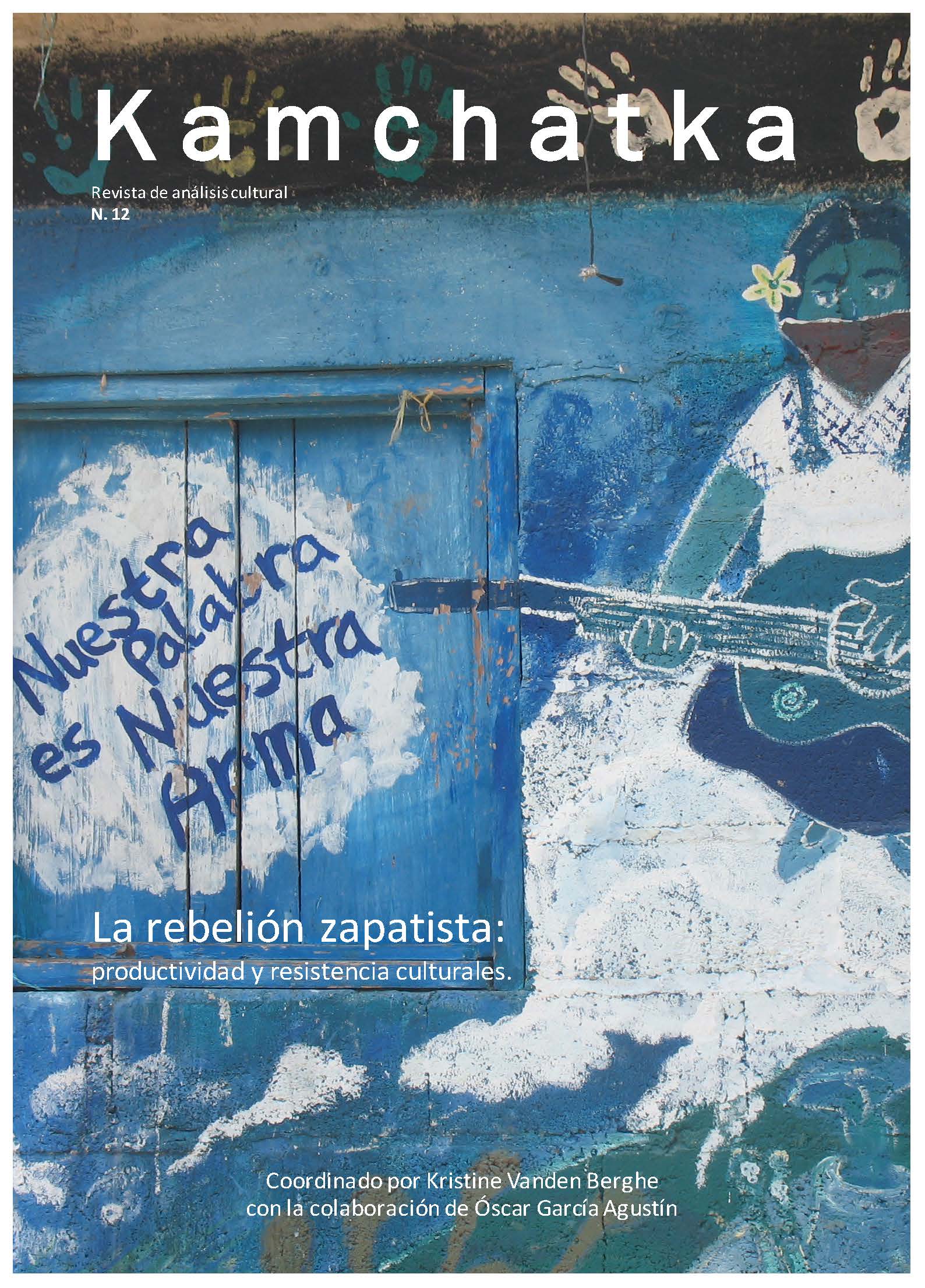Autofiction, history and myths in the narratives of subcomandante Marcos
DOI:
https://doi.org/10.7203/KAM.12.12326Keywords:
Zapatista National Liberation Army (EZLN), history, narrative, autofiction, mythification Abstract
Abstract
The uprising of 1994 by the Zapatista National Liberation Army (EZLN) in Mexico, represented not only a political and military event but also a discursive one. In this study, I analyse the ways in which historical and factual dimensions are intertwined with the personal accounts written by Subcomandante Marcos; military leader and spokesperson of the EZLN. The deputy commander’s writing poses specific difficulties, given that he wrote directly from the frontline and under the urgency of this historical period. Such writing conditions stimulate us to examine the transitional modalities between live memory and textual representation, and to look at the genres and rhetorical devices that are used to represent this historical period.
Keywords:
 Downloads
Downloads
 References
References
Aínsa, F. “La invención literaria y la ‘reconstrucción’ histórica”. América - cahiers du CRICCAL, 12 (1993): 11-26.
Aínsa, F. (2003). Reescribir el pasado. Mérida-Venezuela: Ediciones El otro, el mismo.
Castellanos, L. (2008). Corte de caja. Entrevista al Subcomandante Marcos. México: Grupo Editorial Endira México.
De vos, J. (2002). Una tierra para sembrar sueños: Historia reciente de la Selva Lacandona. México: Fondo de cultura económica.
Eliade, M. (1963). Aspects du mythe. Paris: Éditions Gallimard.
Eissen, A. y Engélibert, J.-P. (eds.) (2000). “Avant-propos”. Eissen, A. y Engélibert, J.-P. La dimension mythique de la littérature contemporaine. Poitiers: La licorne, Université de Poitiers: p. 3-12.
Ezln. (1995). Documentos y comunicados. México: Ediciones Era. Tomo 2.
Ezln. (1997). Documentos y comunicados. México: Ediciones Era. Tomo 3.
Favre, H. “Mexique: le révélateur chiapanèque”. Problèmes d’Amérique Latine 25 (1997): 3-26.
Fuentes, C. (2002 [2000]). Los cinco soles de México. Barcelona: Editorial Seix Barral.
Fuentes, C. (1998). Un temps nouveau pour le Mexique. Paris: Gallimard.
García de León, A. (1997). “La historia si acaso tiene un sentido…” EZLN. Documentos y comunicados. México: Ediciones Era, Tomo 3: 13-21.
Gasparini, P. (2004). Est-il je ? Roman autobiographique et autofiction. Paris: Éditions du Seuil.
Gil, H. y Joly, M. (1994). “Las representaciones del tiempo histórico”. Covo-Maurice, J. (eds.). Las representaciones del tiempo histórico. Lille: Presses Universitaires de Lille: 11-17.
Giudicelli, C. “Introduction”. America - Cahiers du CRICCAL 12 (1993): 9-10.
González Vigil, R. (2005 [1995]). “Introducción”. Arguedas, J. M. Los ríos profundos. Madrid: Ediciones Cátedra: 11-133.
Che Guevara, E. (1963). “Prólogo”. Che Guevara, E. Pasajes de la guerra revolucionaria: https://www.cheguevara.com/che/pdf/Esp/libro4.pdf
Lienhard, M. (2003 [1990]). La voz y su huella. México: Ediciones Casa Juan Pablos y UNICACH.
Lyotard, J.-F. (1979). La condition postmoderne. Paris: Les Éditions de minuit.
Pellicer, J. “La gravedad y la gracia: el discurso del subcomandante Marcos”. Revista Iberoamericana 174 (1996): 199-208.
Ricoeur, P. (2000a). L’écriture de l’histoire et la représentation du passé. Paris: Le Monde: 16.
Ricoeur, P. (2000b). La mémoire, l’histoire, l’oubli. Paris: Éditions du Seuil.
Rodriguez, R. “Portrait de Rafael Guillén, alias le sous-commandant Marcos”. Revue Esprit 6 (1996): 129-146.
Trejo Delarbre, R. (1994). Chiapas la comunicación enmascarada. México: Editorial Diana.
Vanden Berghe, K. (2005). Narrativa de la rebelión zapatista. Los relatos del Subcomandante Marcos. Madrid y Frankfurt: Vervuert Iberoamericana.
Vega, M. J. Introducción a la crítica postcolonial. Barcelona: Crítica, 2003.
Villoro, J. “El guerrillero inexistente”. Biblioteca electrónica (1998): http://www.analitica.com/BITBLIO/villoro/guerrillero.asp.
Volpi, J. (2004). La guerra y las palabras. Barcelona: Editorial Seix Barral.
Downloads
Published
How to Cite
-
Abstract956
-
Artículo (Español)546
Issue
Section
License
This journal provides an immediate free access to the content on the principle that freely make investigation available to the public, which promotes an increased global knowledge exchange.
Unless otherwise indicated, texts published in this journal are under the license Attribution-NonComercial 4.0 by Creative Commons. These texts may be copied, distributed and publicly communicated whenever the publication’s author and title are quoted and whenever they are not used for commercial purposes. In any case, intellectual property of the articles and its potential economic rights entirely belong to its authors.
The full license can be consulted on https://creativecommons.org/licenses/by-nc/4.0/. We encourage authors to disseminate papers published in Kamchatka. Journal of cultural analysis electronically, in institutional digital repository or in their websites.





